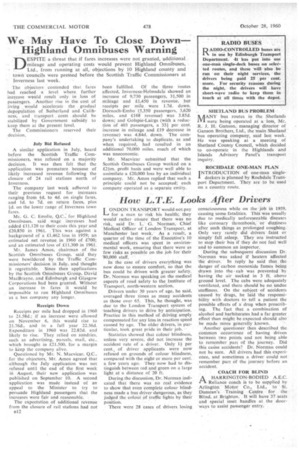We May Have TO Close Down —
Page 46

If you've noticed an error in this article please click here to report it so we can fix it.
Highland Omnibuses Warning
ESPITE a threat that if fares increases were not granted, additional mileage and operating costs would prevent Highland Omnibuses, Ltd., from running at all, objections by 10 Highland county and town councils were pressed before the Scottish Traffic Commissioners at Inverness last week.
The objectors contended that fares had reached a level where further increase would result only in .loss of passengers. Another rise in the cost of living would accelerate the gradual • depopulation of Sutherland and Caithness, and transport costs should be stabilized by Government subsidy to keep them at the present level.
The Commissioners reserved their decision.
July Bid Refused A similar application in July, heard before the Scottish Traffic Commissioners, was refused on a majority decision. It was then felt that the application was premature because of likely increased revenue following the closure of 24 rail stations north of Inverness.
The company last week adhered to their previous request for increases ranging from +d. to 4d. on single fares. and Id. to 7d. on return fares, plus
d. on the lower range of Inverness town fares.
Mr. G. C. Emslie, Q.C.. for Highland Omnibuses, said wage increases had added £11,120 to their, costs this year and £20,850 in 1961. This was against a background of a £1,462 loss in 1959; an estimated net revenue in 1960 of £700; and an estimated loss of £11,300 in 1961.
Mr. James Amos, chairman of the Scottish Omnibuses Group, said they were bewildered by the Traffic Commissioners' decision in July, and thought it regrettable. Since then applications by the Scottish Omnibuses Group, David MacBrayne, and Edinburgh and Glasgow Corporations had been granted. Without an increase in fares it would be impossible to run Highland Omnibuses as a bus company any longer.
Receipts Down Receipts per mile had dropped in 1960 to 21.58d.; if an increase were allowed on November 6, this would rise to 21.76d., and in a full year 22.36d. Expenditure in 1960 was 22.82d. and likely to rise. They relied on sundries, such as advertising, parcels, mail, etc.. which brought in £21,500, for a margin to keep the company alive.
Questioned by Mr. N. Macvicar. Q.C., for the objectors, Mr. Amos agreed that although the July application was not refused until the end of the first week in August, their new application was published on September 10. A second application was made instead of an appeal to the Minister to try to persuade Highland passengers that the increases were fair and reasonable.
The expectation of additional revenue from the closure of rail stations had not B12 been fulfilled. Of the three routes affected, Inverness-fielmsdale showed an increase of 9,730 passengers, 31,500 in mileage and £1,450 in revenue, but receipts per mile, were 1.7d. down. Dornoch-Embo (5,350 passengers, 3,620 miles, and £168 revenue) was 3.85d. down; and Golspie-Lairgs (with a reduction of 403 passengers, a 33+ per cent. increase in mileage and £19 decrease in revenue) was 4.84d. down. The company's undertaking to duplicate, as and when required, had resulted in an additional 70,000 miles, much of which was uneconomic.
Mr. Macvicar submitted that the Scottish Omnibuses Group worked on a £21m. profit basis and were well able to assimilate a £20,000 loss by an individual company. Mr. Amos replied that such a principle could not be accepted; each company operated as a separate entity. SHETLAND BUS PROBLEM
AfiANY bus routes in the Shetlands IVI were being operated at a loss, Mr. R.. J. H. Ganson; managing director of Ganson Brothers, Ltd.; the main Shetland bus operating company, said last week. He was speaking at a meeting of Shetland County Council, which decided to co-operate in the Highlands and Islands Advisory Panel's transport inquiry.
ROCHDALE ONE-MAN PLAN I NTRODUCTION of one-man single deckers is planned by Rochdale Transport Department. They are to be used on a country route.




















































































































